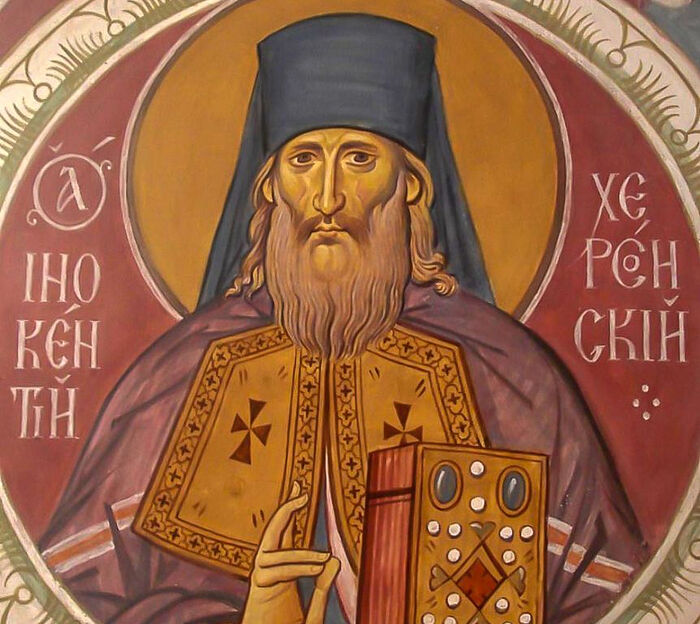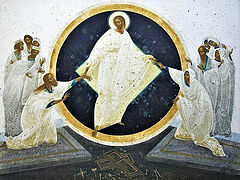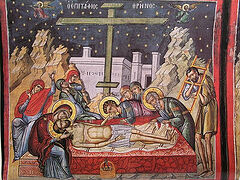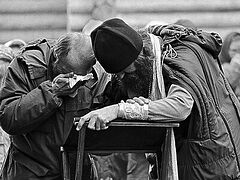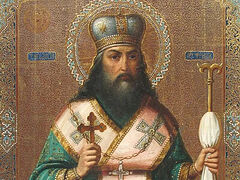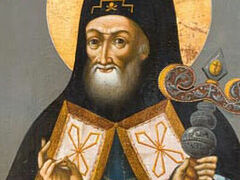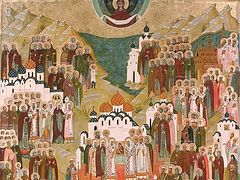Holy Hierarch Innocent (secular name Ivan Alexeevitch Borisov), Archbishop of Kherson and Tauride was born on December 15, 1800, in Orel Province, in the town of Eltz. His father was Priest Alexei Borisov, who served at the Dormition Church.
In 1819, Ivan Borisov graduated with honors from the seminary, and entered the Kiev Theological Academy. There, he devoted himself to his studies with such fervor that he sometimes spent his nights immersed in his books. In obedience to an internal calling, he found himself devoting more time to homiletics, the composition and refining of sermons than on any other subject.
In 1823, the twenty-three-year-old Ivan Alexeevitch completed the full course of academic study with a master's degree, and was assigned to the St. Petersburg Theological Academy as inspector and professor of Church History; but less than three months later, he became rector of the St. Alexander Nevsky Religious School in St. Petersburg. At the same time, he was tonsured a monk with the name Innocent, and was ordained a hieromonk. In December, 1824, Fr. Innocent was assigned to be adjunct professor of theology at the St. Petersburg Theological Academy, and several months later was appointed its inspector and extraordinary professor. In March 1826, he was elevated to the rank of archimandrite.
Usually Fr. Innocent would present his lectures by heart. He attentively followed the state of, and advances in, the natural sciences; in his view, they not only did not conflict with theology, but in the best ways possible were useful to theology.
From among his qualities, Archimandrite Innocent, whose soul was brimming over with love, drew the art of instilling a good sense of community among the professors: Wherever he went, he brought peace and calm. In the nine years that Fr. Innocent was rector, he and the academic family were of one mind, and lived as one.
Fr. Innocent gained particular renown for his extraordinary talent as a preacher. Vladyka Innocent was later to become known as the “Russian Chrysostom.” He established a new, Russian, school of homiletics, devoid of external showiness and dry erudition.
In addition to his sermons, Vladyka left us many remarkable instructional works and translations, such as: The Life of St. Cyprian, The Life of the Holy Apostle Paul, Monument of Faith, The History of the Ecumenical Councils, a translation of The Rudder, and many others.
The Imperial Academy of Science and various learned societies honored the homilist’s literary accomplishments by accepting him as one of their members. In time, sermons were translated into Greek, German, French and Polish.
On November 21, 1836, the Feast Day of the Most Holy Theotokos’ Entry into the Temple, in St. Petersburg’s Kazan Cathedral, Archimandrite Innocent was consecrated Bishop of Chigirin.
In March 1840, he was appointed Bishop of Diocese of Vologda. After serving there for nine months, he was transferred to the Kharkov Diocese, where he served approximately seven years. In that time, he restored the Akhtyrsky and Svyatogorsky Monasteries, and opened the St. Nicholas women's monastery. The making of Processions of the Cross in Kharkov to commemorate the translation of the Miraculous Icon of the Mother of God from the Kuryazhsky Monastery to Kharkov was at Vladyka’s inspiration.
In 1845 Vladyka was elevated to the rank of archbishop. Three years later, he was appointed to the Kherson-Tauride Diocese. The archpastor set for himself as the primary goal of his tenure at that diocese, that the ancient Christian monuments of Crimea destroyed by the Tatars would be restored, and that he would found the “Russian Athos.”
Wanting to preserve the ruins of ancient Kherson, renowned as the site where Vladimir, Great Prince of Rus' was baptized, the Most-Reverend Innocent asked the governor of the Caucuses to grant him those ruins. There, in the wilderness near the remains of the former cathedral church, he erected a small church dedicated to the memory of Princess St. Olga, along with a small residence for monastics. Later, he renovated the ancient church that had been carved out of the Inkerman Cliff by St. Clement. He consecrated it as the Church of the Hieromartyrs Clement and Martin, who had been dispatched to Kherson as stonemasons, and suffered for their Faith there. In the same cliff, he also established a small skete. During his travels throughout Crimea, Vladyka would usually leave his fellow travelers below while he ascended the hill summits where the ancient spiritual strugglers had carried on their labors, in order to pray there.
In the last years of his life, during the calamities of the Crimean War, the Most Reverend Innocent played an extremely active archpastoral role, and exerted an exceedingly beneficial effect on the troops.
Holy Hierarch Innocent’s greatness of soul was evident as well in his visits to wounded soldiers in field hospitals, where typhus was rampant and where one could be an eyewitness to all the great sorrows, all the sufferings inflicted by war. During battles, he would go about the army ranks, encouraging the heroic soldiers. Here as well the courageous father and pastor was also an angel and comforter to the suffering.
At the coronation of Emperor Alexander II, Archbishop Innocent was appointed a member of the Holy Synod.
The intensity of the glorious archpastor’s labors and concerns adversely affected his health. While in Sebastopol during a battle between the Russian forces and their foes, Vladyka fell ill, and in Kherson on May 25, 1857, the glorious Feast of the Life-giving Trinity (Pentecost), while on his way back to Odessa, he reposed.
He was canonized by the Russian Orthodox Church in 1997.
Parish Life, May 2021
St. John the Baptist Cathedral, Washington, DC

